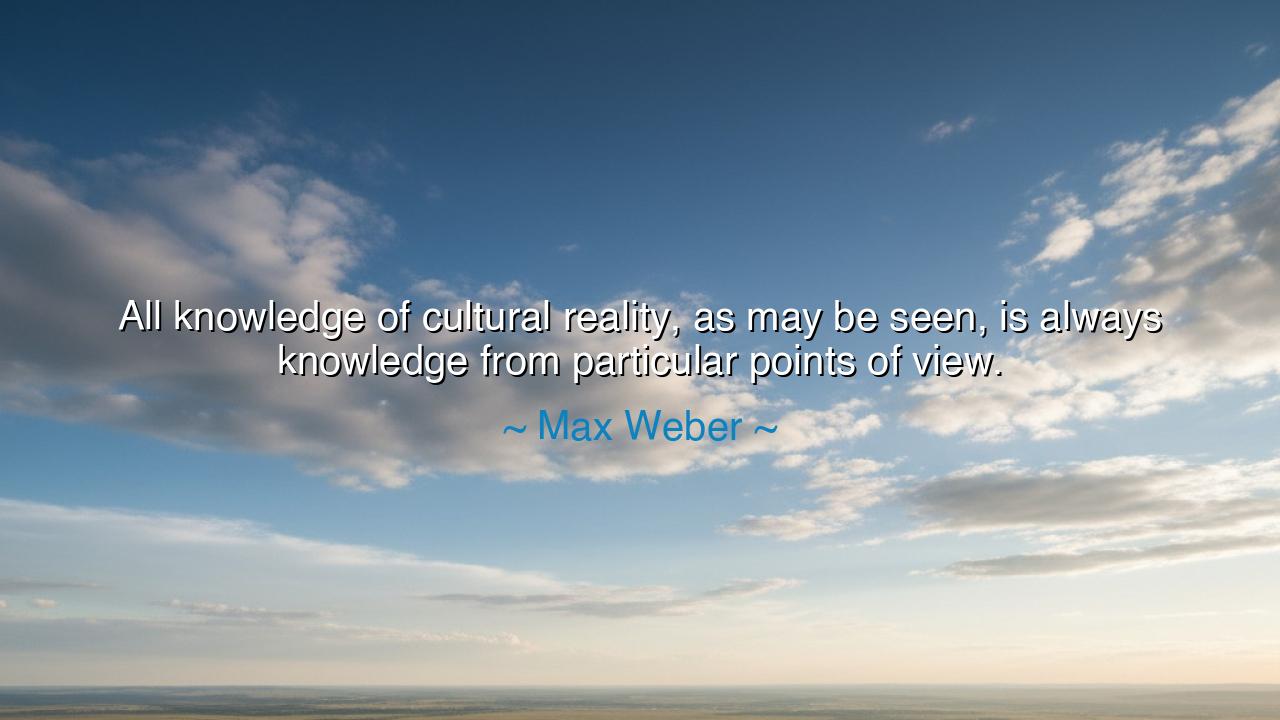
All knowledge of cultural reality, as may be seen, is always
All knowledge of cultural reality, as may be seen, is always knowledge from particular points of view.






“All knowledge of cultural reality, as may be seen, is always knowledge from particular points of view.” — Max Weber
In this timeless reflection, Max Weber, the philosopher and father of modern sociology, reveals a truth that humbles even the greatest minds: that all human knowledge is shaped not by pure objectivity, but by the lens through which we see the world. Every civilization, every scholar, every soul, sees reality not as it is in itself, but as it appears through the veil of perspective—woven from culture, experience, and belief. To understand the world, Weber reminds us, is not to stand outside it like a god, but to recognize that we are all within it, each gazing from our own shore of understanding.
This insight was born in an age of transformation. The late nineteenth century, when Weber lived, was a time of faith in reason and progress. The world was being measured, mapped, and explained by science, which claimed to see reality with perfect clarity. But Weber, wise among the wise, saw a hidden danger: that man, in his pride, would forget that knowledge itself is human, and thus bound by the culture that shapes his questions and gives meaning to his answers. Even the scientist, he said, chooses what to study based on what he values—and values, though noble, are born of society, not of pure reason.
To see this truth, one need only look upon the tapestry of history. The Greeks, who gazed at the stars, saw in them the music of divine harmony. The medieval scholars saw the same heavens as a reflection of God’s order. The modern astronomer sees them as nuclear furnaces scattered through an expanding void. Each view is built upon knowledge, yet each arises from a different point of view, shaped by the spirit of its time. The stars did not change—the eyes of man did. And so it is with all of cultural reality: art, law, faith, and even morality. They are mirrors of the age that conceives them.
Consider also the story of Mahatma Gandhi and Winston Churchill, two men of towering intellect and conviction, yet divided by vision. Gandhi saw India’s struggle as a moral awakening—a call to return to truth, simplicity, and compassion. Churchill, shaped by the empire that raised him, saw the same struggle as rebellion and chaos. Both were men of reason and learning, yet their knowledge of the same reality was bound to their cultural point of view. Neither was blind, yet neither saw the whole. Only history, that slow teacher, could reveal how each held a fragment of the greater truth.
From Weber’s wisdom we learn that to claim perfect knowledge is to fall into the oldest sin of pride. For no man, no nation, no culture possesses a monopoly on truth. Each perspective contributes a piece to the mosaic of understanding, but the full picture belongs to none. The wise therefore listen—not to one voice, but to many. They seek not to conquer other perspectives, but to learn from them. They know that what is true in one time and place may seem strange in another, and that wisdom lies not in denying difference, but in embracing it.
This truth is more urgent now than ever, in an age where the world has grown small, yet hearts have grown narrow. Each group, each ideology, each nation clings to its point of view as if it were the whole of reality, forgetting that to see only one side is to live half-blind. The lesson Weber leaves us is a call to humility—to remember that the knowledge of cultural reality must always include compassion, curiosity, and a willingness to see through another’s eyes.
So, dear seeker, cultivate the art of listening. When you encounter ideas that challenge your own, do not shut them out in fear or pride. Ask instead, From what point of view does this truth arise? Travel, read, converse, and reflect, for the more perspectives you hold, the closer you come to wisdom. Let your knowledge be like a river—flowing, gathering, deepening with every stream it meets. And when you speak of truth, do so with reverence, knowing that even as you hold it, it shifts and gleams in countless colors beneath the eternal light of human understanding.
For in the end, Weber’s words remind us that truth is not a single mountain to be climbed, but a vast horizon to be walked together, each traveler seeing from his own height and angle, yet all moving toward the same distant dawn.






AAdministratorAdministrator
Welcome, honored guests. Please leave a comment, we will respond soon